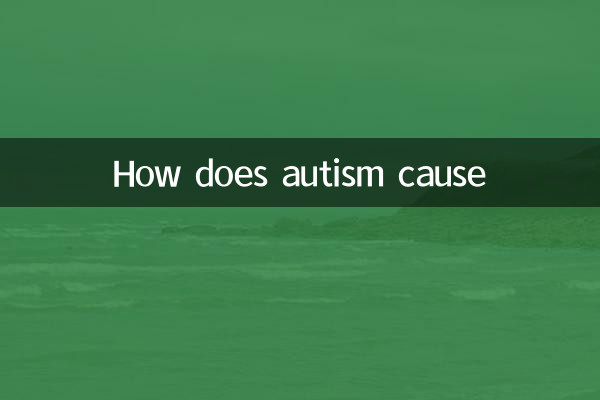How does autism cause
Autism Spectrum Disorder (ASD) is a neurodevelopmental disorder, mainly manifested as social interaction disorder, language communication difficulties, and repetitive and rigid behaviors. In recent years, the incidence of autism has shown an upward trend, which has attracted widespread attention. So, how does autism cause? This article will analyze the possible causes from genetics, environment, neurobiology and other aspects, and combine them with popular topics and hot content in the past 10 days to provide you with comprehensive answers.
1. Genetic factors

Studies have shown that genetic factors play an important role in the onset of autism. Here are some genetic mutations and research data related to autism:
| Gene name | Related research | Influence |
|---|---|---|
| SHANK3 | Synaptic function abnormality | Social disorders, language development stunted |
| CHD8 | Chromatin remodeling abnormality | Intellectual disability, behavioral rigidity |
| NLGN3/NLGN4 | Synaptic abnormalities | Social communication barriers |
In addition, family studies show that if one of the siblings has autism, the risk of other children is significantly increased.
2. Environmental factors
In addition to genetic factors, environmental factors are also considered one of the important causes of autism. The following are the environmental risk factors that have been studied more in recent years:
| Environmental factors | Research Conclusion | Possible mechanisms |
|---|---|---|
| Pregnancy infection | Increase the risk of fetal neurodevelopment abnormalities | Maternal immune activation affects fetal brain |
| Air pollution | Positive correlation with autism incidence | Heavy metals and particles affect neurodevelopment |
| Pregnancy medication use | Such as anti-epileptic drug valproic acid | Interfere with fetal nerve cell migration |
III. Neurobiological mechanism
There are significant differences in the brain structure and function of autistic patients. The following are the neurobiological characteristics that have been studied most:
| Brain area | Abnormal performance | Possible impact |
|---|---|---|
| Prefrontal cortex | Abnormal neuron connection | Social Cognitive Disorders |
| Amygdala | Increased volume or abnormal function | Difficulty in emotional regulation |
| Brain | Purkinje cell reduction | Movement coordination disorders |
4. Other possible factors
In addition to the above factors, the following content is also the cause of autism that has been discussed more frequently in popular topics in the past 10 days:
1.Imbalance of the intestinal flora: Recent studies have found that the composition of intestinal microbials in autistic patients is different from that of ordinary people and may affect behavior through the "intestinal-brain axis".
2.Immune system abnormalities: Some autistic patients have autoimmune diseases or elevated inflammatory markers, indicating that the immune system may play a role in the onset of the disease.
3.Epigenetics: Environmental factors may affect neurodevelopment by altering gene expression (such as DNA methylation) without changing DNA sequences.
5. Summary and Outlook
The causes of autism are complex, usually the result of the combined action of genetic, environmental and neurobiological factors. There is currently no single factor that can fully explain the pathogenesis of autism, but the progress of multidisciplinary research provides hope for early intervention and treatment in the future. The public should view autism scientifically, avoid misunderstandings and prejudice, and pay attention to cutting-edge research dynamics.
(The full text is about 1,000 words)

check the details

check the details